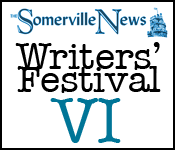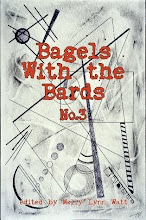
(Gardner at the Au Bon Pain cafe in Davis Sq.,
Somerville home of the Bagel Bards)
Article about Harris Gardner ( co-founder of Bagel Bards) in the Northeastern Alumni Magazine
The People's Poet
“It brings community together—a common ground, you might say,” says poet-about-town Harris Gardner, LA’69, reflecting on the unifying power of verse.
Gardner expresses his enthusiasm for his craft by writing prolifically—a collection of his poems, Among Us, was published last year. He also hosts regular poetry events around the Greater Boston area.
He recalls being introduced to poetry at age fifteen by his tenth-grade teacher: “She gave us an assignment to write a poem. And I said, ‘This is fine; I’ll try another one.’ Just because I wanted to, not because anyone told me I had to.”
To share the vitality he’s found in poetry, Gardner, who lives in Boston, organizes the city’s National Poetry Month Festival, featuring both established and emerging poets. The eighth annual fest was held this April at the Boston Public Library. Writers read from their works in a six-hour marathon.
Three years ago, with friend and fellow poetry enthusiast Doug Holder, Gardner founded a weekly poets group called Breaking Bagels with the Bards. The name came from the group’s original meeting place, the Finagle a Bagel in Harvard Square. When that eatery closed, the Bards switched to alternating meetings at the Au Bon Pain outposts in Davis Square and Central Square. High school graduates to PhDs, the Bards run a wide socioeconomic gamut. Anthologies of members’ poems attract applause outside the café walls.
When he’s not schmoozing with the Bards, Gardner can be found at Borders Books in Downtown Crossing, where another organization he emcees, Tapestry of Voices, invites poets to read each month.
This busy artist, who also finds the time to run his own real estate business, believes the literary arts fill a basic need. “Poetry is very learnable,” he says. “At the community level, people can learn to appreciate poetry, to enjoy poetry, to indulge in poetry, and even to write poetry.
“Even if they’ve never done it before.”
— Nancy Rabinowitz, MA’90





